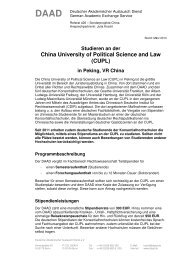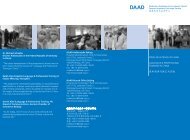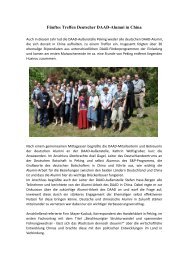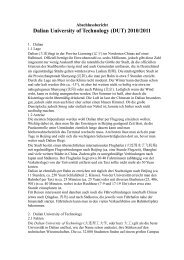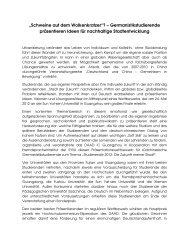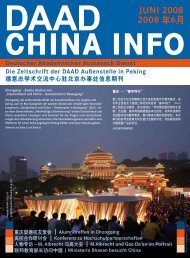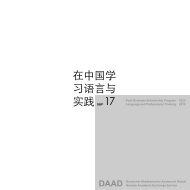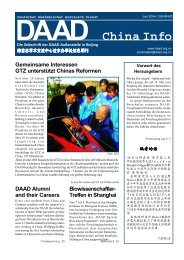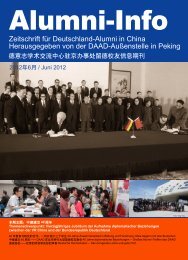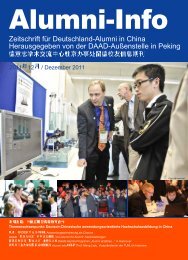China Info
China Info
China Info
You also want an ePaper? Increase the reach of your titles
YUMPU automatically turns print PDFs into web optimized ePapers that Google loves.
Research for Diploma Thesis in<br />
Geo-Ecology: Arsenic Contamination of Rice<br />
Whenever I told people that my diploma<br />
thesis was about arsenic contamination<br />
of rice in <strong>China</strong>, they were very<br />
surprised by the fact that high arsenic<br />
levels can be found in Chinese rice.<br />
Arsenic in rice is a problem that poses a<br />
severe risk to human health, not only in<br />
<strong>China</strong> but also in other countries such<br />
as Bangladesh, Vietnam, or even the US.<br />
The use of contaminated groundwater<br />
for drinking and cooking is the<br />
main origin of arsenic poisoning. An<br />
additional source is the consumption of<br />
crops that were irrigated with<br />
wastewater. In <strong>China</strong>, another route for<br />
arsenic poisoning via domestic coal<br />
combustion is known. Usually people<br />
are not aware of the high arsenic<br />
concentrations in coal. They burn the<br />
coal for heating and drying of food and<br />
are thus exposed to arsenic. The oral<br />
intake of arsenic contaminated water or<br />
soil causes various health problems<br />
including hyperpigmentation,<br />
numbness, cardiovascular diseases and<br />
different types of cancer. Relating to the<br />
above-described arsenic problems, I<br />
wanted to focus in my diploma thesis<br />
on factors controlling arsenic<br />
mobilisation and transport with special<br />
attention on arsenic uptake by rice<br />
plants.<br />
My supervisor, Dr. Andreas<br />
Kappler from the Geomicrobiology<br />
Group at the Center for Applied<br />
Geosciences of the University of<br />
Tübingen in Germany, took the initiative<br />
and contacted an expert in this field,<br />
Prof. Zhu from the research Centre for<br />
Eco-environmental Sciences at the<br />
Farmer from Chenzhou, Hunan province, using wastewater for irrigation of crops. Water is often contaminated<br />
by various elements like As, Cd and Zn due to high mining activity in this area.<br />
Photo: Sarah Richter<br />
Chinese Academy of Sciences in<br />
Beijing. He was immediately interested<br />
to collaborate with us. In the following,<br />
a plan was worked out to exchange<br />
scientific expertise from both sides: a<br />
student from Prof. Zhu’s laboratory,<br />
Xueping Chen, stayed for two months<br />
in Tübingen. In return, I had the great<br />
opportunity to live in Beijing for six<br />
weeks, working in a Chinese laboratory<br />
and gaining an insight into Chinese<br />
culture. Of course, Chinese life is very<br />
different and so is work in a Chinese<br />
laboratory. First of all, there is the<br />
problem of communication, especially<br />
when one’s Chinese language skills are<br />
very close to zero. Sometimes this<br />
would cost me (and of course my<br />
Chinese partners as well) a lot of<br />
patience. Often, however, these<br />
situations ended with laughter when I<br />
tried one more time to make myself<br />
understood with hands and feet.<br />
Regarding communication in English, I<br />
made the experience that many<br />
colleagues in the Chinese laboratories<br />
had good written English skills, but their<br />
spoken English was poor. Mostly, they<br />
hadn’t had a lot of chances to practice,<br />
or unfortunately, were too shy to talk to<br />
me. Another thing was the laboratory<br />
equipment. Generally, the laboratory<br />
was well equipped, but sure, one will<br />
not find all instruments one is used from<br />
one’s home-lab. Sometimes this was<br />
very annoying but, on the other hand, it<br />
stimulated my creativity in finding<br />
alternatives. Therefore, it may have even<br />
improved my understanding of the<br />
processes. Recapitulating the facts,<br />
people were very friendly and helped me<br />
to get along well in a country that bears<br />
a lot of challenges for a European. It was<br />
definitively an experience I will never<br />
forget. (Sarah Richter)<br />
DAAD <strong>China</strong> <strong>Info</strong> 1/2007 17



